
Resident Handbook
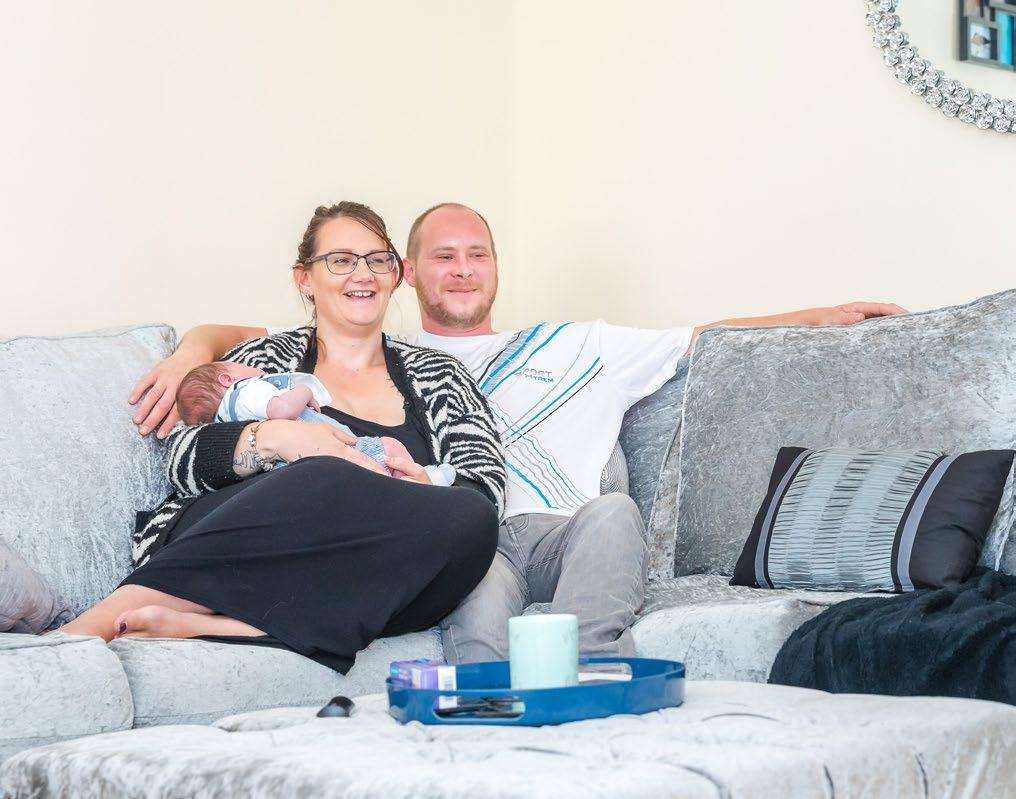



Wishing you a very warm welcome to your new home. We’re delighted you have chosen to be a resident of CCHA. The purpose of this Handbook is to ensure you have everything you need to know about your new home.
CCHA was formed in July 2017, following the merger of Two Castles Housing Association and Derwent and Solway Housing Association. CCHA own and manage more than 7,000 homes, across the North of England.
Our Mission
“Providing affordable homes and sustainable communities with pride, passion and principles.”
Our Corporate Values are the operating principles which guide our internal conduct, as well as our relationship with customers, partners and shareholders:
Ownership - We take ownership
• We take ownership and are focused on resolution - doing what we say we are going to do, when we say we are going to do it.
• We take responsibility for our actions and decisions at all times.
Ambition - We are ambitious
• We listen to each other and our residents and use feedback to continually learn and improve.
• We are accountable to residents, working in partnership with them, to ensure our residents’ voice and safety is at the heart of everything we do.
• When things go wrong, we apologise, resolve issues quickly and learn from these issues, to prevent them happening again.
• We listen to our staff, support their learning and development, and work as one team.
• We are ambitious; delivering innovative, high quality, choice driven services in a way that we would expect to receive them ourselves.
• We are committed to the communities we serve, working collaboratively in partnership to make these communities great places to live.
For more information about CCHA, please visit our website at www.castlesandcoasts.co.uk
Respect - We are respectful
• We treat each other and our residents the way we expect to be treated ourselves and we try to put ourselves in the shoes of others - with respect, openness, honesty, transparency, and empathy at all times.
• We are inclusive, we respect others and we celebrate diversity.We are a supportive and caring organisation, supportive of each other and our residents.
• We collaborate effectively for the benefit of our residents, working in partnership with them.
We know moving home can be stressful, which is why we’ve pulled together this useful checklist, to help you tick off all the important things you need to remember, as you embark upon your exciting new journey.
Have you:
✓ Redirected your post?
✓ Contacted your internet provider?
✓ Contacted your energy supplier to let them know you are moving?
✓ If appropriate, notified your employer, doctor, credit/loan companies, bank, insurance companies and TV Licensing?
✓ Switched your Council Tax payment?
✓ Contacted the Department of Works & Pensions (DWP) about your benefits e.g. Universal Credit or Housing Benefit?
✓ Cancelled your current home contents insurance and arranged new contents insurance, for your new home (see advice on page 7)?
Once you have received the keys to your new home:
✓ Have you received a Gas Safety Certificate, Electrical Certificate, Asbestos Letter and Electrical Performance Certificate (EPC)?
✓ Have you kept your copies of the Gas Safety Certificate, Electrical Certificate, Asbestos Letter and EPC somewhere safe?
✓ Do you know how to check the smoke alarms and identify the fire exits?
✓ Do you know the location of the stopcock, fuse box and thermostat?
✓ Do you know which day the bins are collected?
For full details of what you need to do to have your gas supply reinstated to your new home, please see our handy guide included with this Handbook.
CCHA is here to help you and you can contact us in the following ways:
Our Customer Services Team is available Monday - Friday, 8.45am - 5pm. The team is your first point of contact at CCHA. Please have your Tenancy Reference Number to hand when contacting the team.
Telephone: 0800 085 1171
Online: www.castlesandcoasts.co.uk/contact
Email: cs@castlesandcoasts.co.uk
If you have an emergency, outside of the operating hours of our Customer Services Team, please call 0800 085 1171 and your call will be answered by our emergency Out of Hours Telephone Provider.
Your Lettings & Neighbourhoods Officer:
Your Income Officer:
Your Property Services Officer:
Please sign up to our Residents’ Portal. This is your own, dedicated, CCHA online account.
On our Residents’ Portal, you can:
• make payments
• report repairs
• update your tenancy and more
Full details of how to sign up to our Residents’ Portal can be found on page 9.
Our texting service number is 07554 654 900. Please save this number in your mobile phone.
You can text us by using the codes below, to receive a text/call back with the information you have requested:
Code Description
REG To register with our texting service
BAL To request your current rent balance
PAID To find out your last payment information
RENTCALL
To request a call back from your Income Officer to discuss your rent account.
REPAIR To request a repair
STOP To stop using our texting service
When you move into a CCHA home, you have to sign a Tenancy Agreement between you (the tenant) and us (the landlord), setting out the terms of your tenancy. It is a legally binding contract, which sets out what legal rights and responsibilities we both have. Please find below information on the different types of tenancies.
Assured Shorthold Tenancy Agreements are for a limited period of time, usually 12 months, but can be extended for an additional period of up to six months, in certain circumstances. If there hasn’t been a breach of tenancy conditions within the first 12 months of the tenancy, it will automatically convert into an Assured Tenancy.
• Right to succession
• Right to repair
• Right to be consulted on housing management issues
• Right to be consulted on housing matters and kept up to date about any changes that affect Starter Tenancies
• Right to, in certain circumstances, move to another CCHA property, if there is a good management reason for doing so
Assured Tenancy Agreements have no time restrictions and continue until the tenancy is legally terminated by either party.
• Right to succession (succession criteria applies)
• Right to repair
• Right to assignment
• Right to be consulted on housing management issues
• Right to, in certain circumstances, move to another CCHA property
• Right to, in certain circumstances, buy your home
• Right to take in a lodger
• Right to improve your home (some improvement require permission to be granted by CCHA) - see page 22 for more information
• Right to transfer or exchange your home
• Pay the required weekly rent
• Keep your home free from damage, clean and decorated
• Respect your neighbours. Make sure that anyone living at, or visiting, the property does not cause a nuisance
• Keep your garden in a neat and tidy condition
• Allow access to your home for inspections and repairs
• If your circumstances change, in respect of your household or your tenancy, you must contact and inform CCHA immediately
• Provide us with 4 weeks notice, if you wish to end your tenancy
A joint tenancy is one in which two or more people have been given the same tenancy. Both joint tenants must keep to the Tenancy Agreement and ensure that all the rent and any other charges are paid. Both tenants are jointly liable for all tenancy conditions.
We appreciate that home contents insurance can feel like something you could easily cut back on if money is tight, but it is so important to have a policy in place, should the worst happen, such as flood, fire, theft, a burst pipe or accidental damage. Having home contents insurance gives peace of mind that your home contents are covered and can be replaced, if necessary.
We work in partnership with the Northern Housing Consortium, to provide an affordable home contents policy. To apply, please visit castlesandcoasts.co.uk/ your-home/looking-afteryour-home and click on the Application Form button. You can also contact the insurance provider directly on 0345 671 8172. You may wish to consider price comparison websites for alternative quotes.
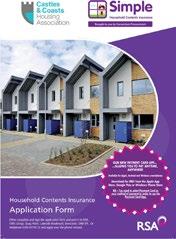
Please note - CCHA will not accept liability for damage, theft or loss of personal belongings, household contents and electrical goods.

The rent we receive allows us to provide you with the services we deliver, for example, repairs, improvements to your home and providing you with housing management services.
Your rent is reviewed once a year, and you will receive at least four weeks’ notice of any adjustments.
Paying your rent is a condition of your Tenancy Agreement. You must pay your rent in advance, on time, on the agreed day and by the agreed method.
Failure to pay your rent may result in Court Action and you will be recharged for any Court costs.
If you have a tenancy where we provide extra communal services, such as cleaning, landscaping, lighting or heating, your rent will include a service charge.
We review your service charges each year, alongside the review of your rent charge. Service charges are based on the costs for the service provided to you. As with the review of your rent, you will receive at least four weeks’ notice of any adjustments.
We’re currently looking at ways to get better value for money for any of the gas and electricity which is supplied to the communal areas shared with other residents, and (in some cases) to residents’ homes, through CCHA’s energy supplier. To ensure that we get the best deal we are hoping to enter a new long-term contract, as this is likely to offer better value than a short-term contract. To do this, we would usually need to consult with residents by following the process set out in Section 20 of the Landlord & Tenant Act 1985. This process usually takes several months and because energy suppliers need us to make decisions very quickly due to the energy market changing rapidly, we aren’t able to follow the usual consultation process. Instead, we’re making an application to the First Tier Tribunal (Property Chamber) (the Tribunal) for what’s known as dispensation from these requirements.
To minimise costs, a copy of our application (with personal details deleted), will be displayed on our website. We will also add new documents as our application progresses, including the final decision of the Tribunal. To view these documents please go to www.castlesandcoasts.co.uk/your-home/ energy-supplier
If your tenancy is a joint tenancy, each tenant is equally responsible for the payment of the whole of the rent and any other payments due to CCHA.
Rent Statements can be viewed by logging on to the Residents’ Portal or by calling the Income Team on 01228 635492. Annual Rent Statements will be provided to you.
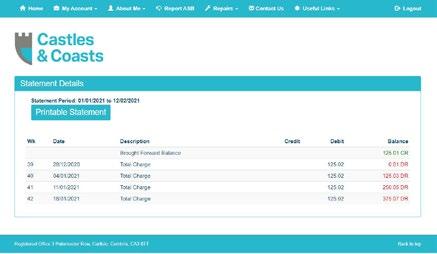

There are a number of ways for you to pay your rent and services charges. These are:
To set up a Direct Debit with us, or to find out more information, please contact our Income Team on 01228 635492.
Please note: CCHA has the option to amend your Direct Debit payments, in line with any rent changes. You will be informed of any changes in advance.
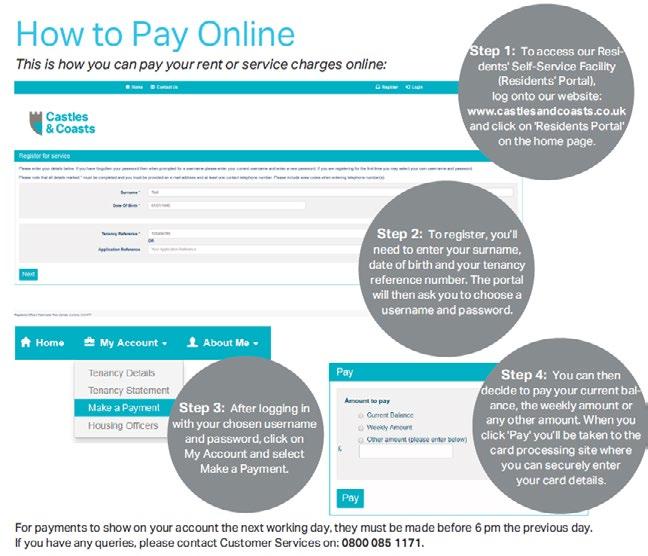
You can make payments at any time, day or night, using your debit card, by signing up to our Residents’ Portal. Visit castlesandcoasts.co.uk/your-home/paying-your-rent and click the Residents‘ Portal button to register.
Select ‘Make a Payment’. To register for an account, all you need is your ‘Tenancy Reference Number’. You can find this reference on any CCHA letter or by calling our Customer Services Team.
To set up a Standing Order with your bank, you will need to use the following information:
Account No: 90866105
Sort Code: 20-18-62
Quote your ‘Tenancy Reference’
You can also pay via internet banking, using the above details.
Payments can be made any time, day or night, by logging into the Residents’ Portal.
You can make a payment over the phone by contacting a member of our Income Team on 01228 635492, who will be happy to take payment using your debit card over the phone.
To set up payments using Allpay, please contact our Income Team on 01228 635492
If you fail to keep up with payments, your account will fall into arrears. At this point, CCHA will contact you to advise you of the outstanding balance and to request payment.
If you fail to respond or do not keep to agreements to repay the debt in a reasonable time, legal proceedings will be started. These legal proceedings could ultimately result in the loss of your home.
If you are in financial difficulties, it is important that you let us know as quickly as possible, so that we can help you work out a way to pay.
If you can’t pay your rent or you have difficulties paying, please call our Income Team straight away on 01228 635 492. The earlier you tell us about your situation, the easier it is to help you sort the problem out.
If you are having problems paying your rent, or you have had a change in circumstances which makes you worried about paying your rent, please contact our Income Team on 01228 635492, as soon as possible.
The sooner you contact us, the more likely we are able to help you.
As a resident of CCHA, we are here to help you and can do this in a number of ways.
We can provide information on the benefits you are entitled to and how to claim them. We can also help you access affordable household items, should you require.
This support is on offer to our residents through our Financial Inclusion Service. To find out more about the service we can offer to help you, please contact our Income Team on 01228 635492.
In addition to the support we can offer our residents, please find below a list of some other organisations who may be able to assist you.
Money Advice Service
Step Change Debt Charity
The Money Advice Service can provide you with free and impartial money advice. They can provide you with advice and guides to help support you with your finance. Subjects covered are debts and borrowing.
www.moneyadviceservice.org.uk / 0300 500 5000
Step Change Debt Charity is a national charity which provides free debt advice, either over the telephone or online, to help transform the lives of those struggling with the stress and worry of problem debt.
www.stepchange.org / 0800 138 1111 (Free from all landlines and mobiles)
Citizens Advice provide free, confidential and impartial advice. Their goal is to help everyone find a way forward, whatever problem they face.
Citizens Advice
Debt Support Trust
National Debt Helpline
www.citizensadvice.org.uk / 03444 111 444
Debt Support Trust is a not for profit debt advice charity with trained, friendly debt advisors who can advise you on suitable debt solutions. They are a national debt advice charity helping people across the UK.
www.debtsupporttrust.org.uk / 0800 085 0226
National Debt Helpline is an independent charity, dedicated to providing free debt advice, via phone and online, to people across the UK.
www.nationaldebtline.co.uk / 0808 808 4000
We ask all residents and visitors to be considerate of their neighbours when parking vehicles.
It is important not to cause an obstruction to access, to any properties.
You must receive written permission, if you want to erect a shed or outbuildings in your garden.
Residents who wish to keep a pet must, firstly, have written permission from CCHA, where the Tenancy Agreement allows.
You must ensure you put all rubbish in the wheeled bin or black sacks and leave it out for collection, on the appropriate day. Please refer to your Local Authority website for more information on bin collection days. If you live in a block of flats, you must dispose of all rubbish appropriately and not store bags of rubbish in communal areas. Organisations, such as your Local Authority or charities, i.e. the British Heart Foundation, can collect large items of furniture if required; however, there may be a charge.
If you have your own garden, it is your responsibility to maintain it. All garden waste must also be placed in the appropriate wheeled bin, or in a compost bin.
You must not carry out repairs to vehicles, over a long period of time, outside your home, as set out in your Tenancy Agreement.
If you have problems with mice, insects or other pests, you must contact your local Environmental Health Department.
You must keep your home in a good, clean condition and decorate, when required.
Permission must be sought prior to installing any form of CCTV.
CCHA carries out electrical checks every five years and at the start of every tenancy, in line with good practice recommended by the Health & Safety Executive (HSE). This ensures your home’s electrical installation and wiring is safe when you move in and that it is maintained in a safe condition, throughout your tenancy. There are also things you can do to minimise any risk to you and your family.
How to keep you and your home safe:
• Do not carry out any electrical alterations or improvements without CCHA’s permission
• Make sure you know where your fuse box is, so you can turn the mains switch off, in an emergency
• Never overload sockets
• Maintain any electrical items you bring into your home
• Ensure plugs are not visibly damaged and replace, if necessary
• Check visible leads and cables are in good condition and replace, if necessary
• Check light fittings and plug sockets are not visibly damaged and are in good condition. Please contact our Customer Services Team if you think they need repairing or replacing

• Always use an RCD (residual current device) on outdoor electrical equipment (this instantly turns off the power if there is a fault and can be found in any DIY store)
• Never store combustible materials near the fuse box or the electricity meter
• Never store anything on top of a microwave
• Never run cables under carpets or rugs
• Never take mains powered electrical items, into the bathroom or touch anything electrical when wet
• Always switch off electrical items, when you are not using them
• Register all appliances with the manufacturer, so that you can be advised of any recalls
• You must inform us of any electrical problems, as soon as they occur, and we will arrange for an electrician to come to your home
Follow the link below to access the ‘Electrical Safety First’ website, for important information about how you can minimise the risks posed by electricity and electrical appliances. www.electricalsafetyfirst. org.uk/guidance/safetyaround-the-home
When you move into your new home, you should ensure you have a clear Fire Evacuation Plan, which everyone who lives in your home is aware of. If your home has a communal area, the Fire Evacuation Procedure will be displayed within the communal areas.
Here are some home fire safety tips:
• Remember to test all your alarms regularly. CCHA will carry out tests to communal alarm systems
• Keep communal areas, corridors and staircases clear of all items, such as door mats, prams, bikes or plant pots, as these could get in the way of people evacuating the building and could also fuel a fire
• Where possible, smoke outside and make sure cigarettes are extinguished. Never smoke in bed, or anywhere else, if you think you might fall asleep. Do not leave a lit cigarette or pipe unattended
• Candles, tea lights and incense burners should only be placed in stable, heat-resistant holders and ensure they are extinguished before leaving the room. Keep candles well away from curtains, furniture and clothes
• Keep heaters well away from anything flammable
• Don’t overload electrical sockets or use multiple adaptors in outlet sockets
• Never leave pans unattended, when cooking
• Switch off and unplug electrical items, such as TVs, and avoid charging devices, like mobile phones, when you sleep
• Only leave essential appliances switched on, such as the fridge or freezer, turn all others off
CCHA is committed to ensuring the safety of our residents. As a responsible landlord, all of our properties have been surveyed to understand where asbestos is located in your home.
If your home was built before 2000, then it may well have asbestos containing materials within its fabric, but don’t worry, it is perfectly safe, as long as it is maintained in the proper manner. As part of your sign up, you will be advised accordingly if there is asbestos present in your home. Your specific Asbestos Letter will provide information and any actions required.
CCHA has a legal obligation to ensure that your heating system is safe to use. In order to confirm this, we carry out regular servicing, depending upon the source of fuel within your home.
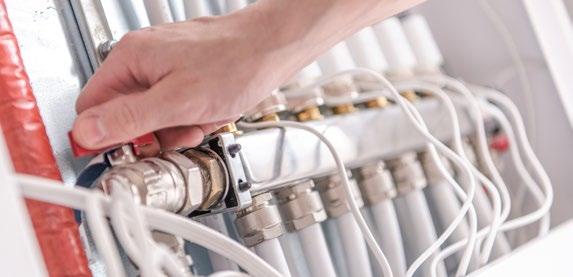
Gas - all gas appliances receive a service every 12 months
Solid Fuel - all appliances receive a service and have their chimney swept every 6 months
Air Source/Ground
Source Heat Pumps - all systems receive a service every 12 months
Solar Thermal - all systems receive a service every 12 months
Oil - all oil appliances receive a service every 12 months
LPG - all LPG appliances receive a service every 12 months
Electric storage/panel heaters are checked every 5 years, as part of the Clectrical Inspection Condition Report
For all sources of fuel, we operate an access procedure two months in advance of the due date and it is essential that you provide us with access to your home, to ensure your safety.
This is a legal requirement and not allowing access represents a breach of your tenancy. There is no cost to you for this service.
Our contractors will write to you, to advise that your service is due. Please allow access, or contact us at your earliest convenience, to arrange an alternative appointment.
Please take the following steps immediately:
• Call the National Grid gas emergency call centre on 0800 111 999
• Evacuate the property
• Keep people away from the area affected
• Wait near, but not in, the property. The National Gas Emergency Service will be with you within two hours
• Turn off the gas at the meter
• Open windows and doors
• Put out naked flames
• Don’t use electrical switches
• Turn off all natural gas fuel burning appliances, including cookers, fires, boilers etc
If you have any symptoms of nausea or headaches, you need to seek immediate medical attention.
If you have a solid fuel appliance, and you can smell fumes, please contact our Customer Services Team, as a matter of urgency, on 0800 085 1171.
You have a key role to ensure water safety in your home, by taking these simple and practical precautions.
Domestic hot and cold water systems can often provide an environment where harmful bacteria can grow. Legionnaires Disease, which is a potentially fatal form of pneumonia, can be caused if small droplets of contaminated water containing legionella bacteria are inhaled.
When moving into your new home, the property may have been vacant, for a period of time. We, therefore, ask you to carry out the following measures, when moving into your new home.
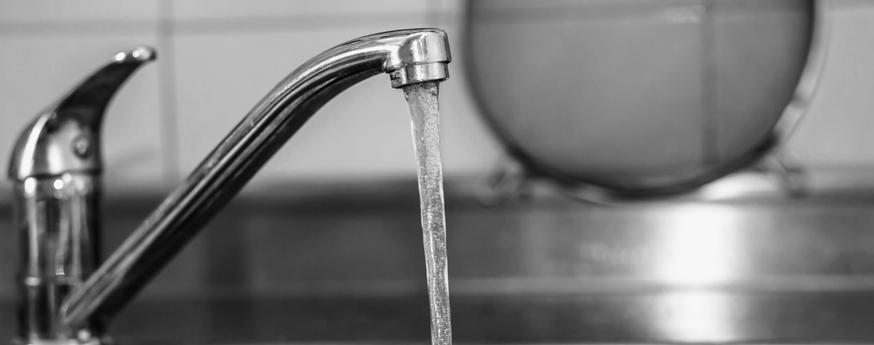
When moving into your new home, it is recommended that you run your taps and shower, for at least two minutes, every week. In addition, we also ask you to flush any toilets, within your home.
Make sure:
• the hot water in the system remains hot
• the cold water remains cold
• the water is kept circulated and your outside taps are used frequently
It is important that you do not change the settings on your boiler or hot water system. Your hot water should be set so that the water is heated up to 60ºC.
Contact us if:
• You have any problems, debris or discolouration in your water
• The cold water is still running warm after you have initially run off any water, which may have collected in the pipes. The temperature should not exceed 20ºC
• Your boiler or hot water tanks are not working properly, particularly if water is not coming out of the taps at a sufficiently high temperature. Unless a thermostatic mixing valve has been fitted, water should come out at a temperature of 50ºC, after it has continuously ran for a minute
• Your use of the water system changes, for example if you stop using the bath because of mobility issues
Our Repairs & Maintenance Team aim to provide an excellent repairs service and you can contact us 24 hours a day, 7 days a week, to report a repair. We prioritise our repairs, as follows:
We aim to attend and make safe all emergency repairs within 24 hours.
Emergencies are problems that present immediate risks to your safety, security or health.
To report an emergency repair, call us immediately on 0800 085 1171
Emergency repairs include:
• A burst pipe
• No power to your home
• Your home is not secure (e.g. if you are locked out)
• You have no heating or hot water (please note that this is only classified as an emergency, during the winter months, or where a resident within the household has a vulnerability)
–within 7 days
These are repairs which significantly affect either your comfort or convenience, or the fabric of your home.
Urgent repairs include:
• Overflow pipe leaking/running constantly
• Leak on the WC cistern or under the sink (providing they can be contained)
• WC not flushing
–within 21 days
These are repairs which will not seriously interfere with your comfort or convenience.
These repairs include, but are not limited to:
• Loose plaster
• Broken wall/floor tiles
• Dripping tap
• Leaking/broken gutters
• Damaged fence panel
We are committed to providing the best quality homes to our residents. Each year, we have a dedicated Planned Works Programme. This programme is created from our Stock Condition Survey, which provides information about all of our properties.
If, as part of our Planned Works Programme, your home is due to have any improvements, you will be contacted directly by CCHA.
As a resident of CCHA, under your Tenancy Agreement, it is your responsibility to:
Complete some replacements or repairs to your home (please see the section below, which details the repairs which you are responsible for).
Report any repairs, which are required to your home, to CCHA (please see details of how to do this on page 17).
Undertake repairs which have been caused to your home, by damage or neglect, or by visitors who have been invited into your home.
CCHA does not cover replacement or repair of some items. These replacements or repairs are your responsibility.
Examples are listed below, and include, but are not limited to:
• Decoration to the inside of your home
• Renewing tap washers
• Replacing chains and plugs for sinks, basins and baths
• Replacing light bulbs
• Replacing starter motors in fluorescent lights
• Replacing fuses
• Renewing toilet seats
• Replacing lost keys or changing the locks (if necessary)
For a full list of repairs which are your responsibility, please visit: www.castlesandcoasts.co.uk/ your-home/rechargeable-repairs
Should CCHA be required to undertake repairs to your home, as a result of damage or neglect, you will be charged for these repairs.
Rechargeable repairs include, but are not limited to:
• Where the repair is not the result of fair wear and tear, and is not the Association’s legal responsibility
• When a contractor has attended for an appointment and has been unable to gain access, on more than one occasion (this will be the call out fee, if this has been charged to the Association, by the contractor)
• When a contractor has attended and it is found that the repair is the responsibility of the resident
• Accidental damage to windows, doors and internal fixtures or fittings
• Non-accidental breakages of glass, where a Crime Reference Number has not been obtained
• Breakages to sanitary ware, including baths, wash basins, toilet basins and cisterns
• Heavy leaks from washing machines, basins, baths and toilet basins
• Blocked sinks or toilets
• Damage to doors and windows (where boarding up would initially be actioned)
• Lost keys
• Removal of items after a resident has moved out and subsequent cleaning of the property
• Damage caused during the execution of a warrant, i.e. Police
• Overgrown and untidy gardens
If you cannot afford to pay for the repairs in one go, then you can set up a Repayment Plan, over a longer period. Once you have paid for the rechargeable repair in full, the job will be raised and the repair will be completed.
As always, you have the option to complete the repairs, which are your responsibility, as long as you use a certified/qualified contractor. Please note, we may ask to survey and approve works once completed.
Former residents will continue to be recharged by CCHA, if expenses are incurred for repairing, clearing or cleaning a property, when it has been vacated. This includes if expense is incurred in redecoration, due to the poor decorative order in which the property has been left.
Outstanding debts due to recharges, may mean you may not be eligible for rehousing with CCHA, until these debts have been cleared.
Condensation is a common problem, within homes. If condensation is not prevented, it can cause mould on your walls, furniture and clothing. If left untreated, mould can increase the risk of respiratory illness.
There is always some moisture in the air, even if you can’t see it. When the air gets colder, it can’t hold all the moisture and tiny drops of water appear. This is condensation.
Condensation will occur on cold windows and walls when you are cooking, washing or having a bath. If there is inadequate ventilation, condensation will accumulate and leave pools of water, which will encourage the growth of unsightly black mould. Although the kitchen and bathroom are generally the main places that create steam and humidity, condensation and mould is more likely to occur in colder areas, such as bedrooms and behind cupboards.
• Treat any mould you have in your home, by washing walls and window frames with a fungicidal wash, which carries a Health & Safety Executive approval number. Please always follow the manufacturers’ guidelines

• The only lasting way to avoid severe mould, is to reduce the relative humidity and condensation, by properly heating and ventilating your home
We have produced some videos about condensation and mould, which provide further information and advice. The videos can be found on our website, www.castlesandcoasts.co.uk/yourhome/tenancy-useful-information
These simple steps will help to prevent condensation occurring, within your home:
Step 1.
Put less water into the air
• Dry clothes outside
• If you are using a tumble dryer, make sure it is vented to the outside
• Put lids on saucepans
• Put a small amount of cold water into the bath, before you turn on the hot tap
• Do not run your shower for longer than is necessary
• Wipe down any condensation or water everyday
Step 2.
Stop water vapour spreading
• Shut kitchen and bathroom doors, when you are cooking and bathing
• Use cooker hoods and extractor fans or open a window
Step 3.
Heating your home
• Apply more heat
• Heat more evenly, i.e. low level of heating all day, rather than quick blasts, when necessary. This should also reduce your heating bills
• Use thermostats to control your heating
• Avoid using bottled gas or paraffin heaters
Ventilate your home
• Keep a small window ajar or trickle vents open, at all times
• Ventilate kitchens and bathrooms, when in use, by opening windows to remove the humid air
• Use extractor fans, if you have them
• Close kitchen and bathroom doors, when in use
• Make sure other doors are closed, especially bedroom doors, as they are normally slightly colder and will attract moisture
• Ventilate cupboards and wardrobes, and avoid putting too much in them, as this stops the air circulating
• Do not put wardrobes against external walls
• Keep furniture away from walls and allow air to circulate
Treating condensation
You will need to take, proper steps to deal with condensation, but some short-term measures every homeowner should take, are:
• Wipe down the windows and sills every morning, using a cloth
• Wring out the cloth, rather than drying it on a radiator
The aim of this section is to provide you with information about how to look after your home, what improvements you can make and how CCHA can help you make your new house, a home.
We want all of our residents to be able to make their CCHA house, their home. As a result, we know that some residents may want to make alterations to their home. However, please note that ahead of making these alterations, you must receive prior written consent from CCHA.
Please find below a list of some example improvements and alterations, which you may wish to make to your home:
• Decorating the outside of your home
• Altering, adding or removing fixtures and fittings, including kitchen and bathroom units, fires and showers
• Installing laminate flooring
• Removing or altering fencing or external walls (including to create a parking space)
• Flagging a garden or yard (or any part of either)
• Installing a shed
• Anything that affects the structure of your home
• Installing external structures, including housing for animals

Making improvements to your home is subject to you having first obtained our written consent, and all of the other necessary approvals, such as Planning Permission or Building Regulation approval. CCHA will ask you to provide copies of the necessary approvals, and you will be required to do this at your own cost. We will not unreasonably withhold our consent; however, we will make it conditional, upon the work being carried out to an acceptable standard.
We understand that some residents prefer to complete their own basic repairs, for example tightening a door handle. This is acceptable to CCHA, as long as the guidelines on page 23 are followed.
If we give you permission to install laminate flooring (whether in a flat or a house), you are agreeing to take it up (at our request), or allow us to take it up, if we need to undertake an inspection or carry out work to your home. If we take it up, we will not be responsible for refitting the flooring, making good or replacing it.
1. The works must be carried out by a competent/qualified tradesperson.
2. All certification, in relation to electrics and gas etc, must be available and all relevant regulations must be adhered to.
3. Any, and all, future maintenance/repair costs, in respect of this alteration, are the responsibility of you, as the resident.
4. Painting kitchen units and external doors is not permitted.
5. Final approval can only be given once the finished works have been inspected and passed. If the works are not to CCHA’s standard, you may be asked to make good or, in default of this, the Association will make the works good and will then recharge you.
6. In the event of your vacation of the property, unless the incoming resident is prepared to accept the alteration, the alteration must be either:
a. Removed by you, and the property made good to the Association’s satisfaction.
b. Any fixtures and fittings being the subject of this alteration are removed and replaced with standard fixtures and fittings to the Association’s satisfaction or, in default of this, the Association will make the works good and will then recharge you.
7. Works may be subject to inspection by a CCHA Property Surveyor.
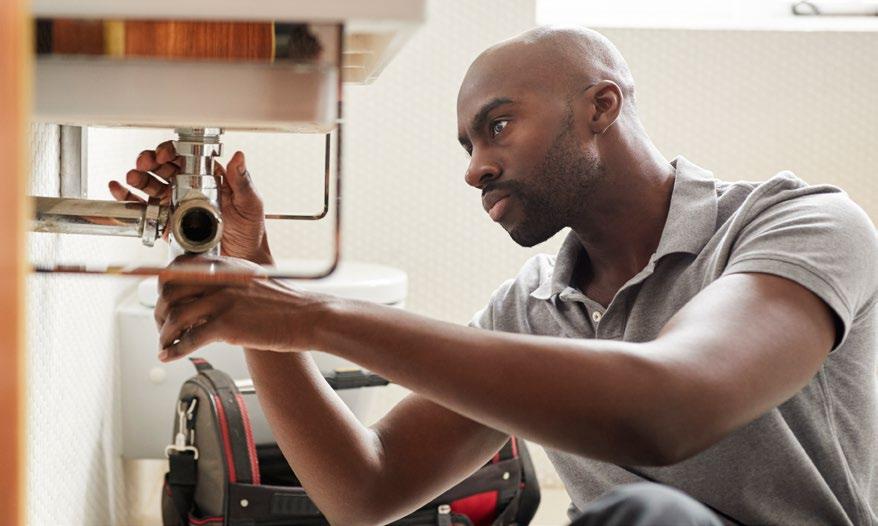
Please note: Permission must be sought prior to installing any form of CCTV.
We encourage our residents to make the best of their communities and surroundings. You should consider your neighbours, when you go about your everyday life, and understand that people have different lifestyles.
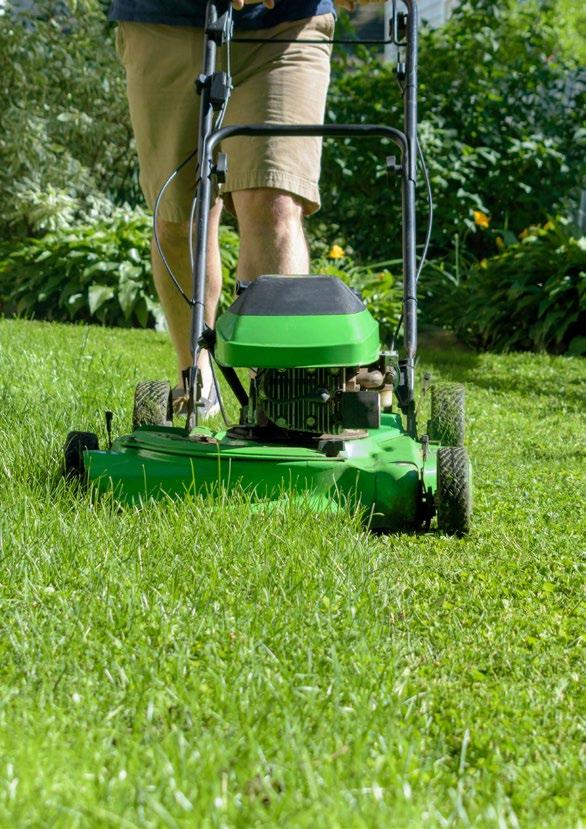
We expect you to accept reasonable activities, such as:
• Children playing
• Use of television and music systems
• People getting up, leaving and returning to their home, and preparing meals, at different times
If a neighbour’s activity becomes unreasonable, you should try to discuss the problem calmly and agree how the situation can be improved.
Being considerate
• Make sure you mow lawns and do housework, such as washing and vacuuming, at reasonable times
• Keep noise levels at reasonable levels, particularly the sound from radios, music systems and televisions
• If you have a dog, do not leave it barking consistently in your home or outside in your garden. You must also clear up any mess it makes
• Warn neighbours when you are going to do something particularly noisy, such as DIY or having a party
• Make sure your children play without disturbing other people
Please remember to be considerate to your neighbours. This is a condition of your Tenancy Agreement.
Anti-Social Behaviour (ASB) is any behaviour or action that interferes, unreasonably, with the quality of life of other residents or prevents them living peacefully in their homes and surroundings.
Examples of ASB include, but are not limited to:
• Violence or threats of violence
• Verbal abuse
• Hate crime and harassment
• Domestic abuse
• Possession, selling or cultivating illegal drugs
• Noise nuisance
• Damage caused to a property
• Nuisance from vehicles
• Criminal activity at a CCHA property
We believe everybody has a right to enjoy their home and to live safely and peacefully. We are committed to working with communities, to tackle ASB and neighbour nuisance.
CCHA will not tolerate ASB. You are responsible for the behaviour of anyone living with you or anyone visiting your home.
CCHA will not accept behaviour that in anyway causes, or is likely to cause, nuisance, annoyance, alarm or distress to your neighbours or anyone who is lawfully in, or in the locality of, your home (including, our staff and contractors).
Further information on this is listed within your Tenancy Agreement.
If you are experiencing any ASB in your home or local neighbourhood, please report the problem, as soon as possible, using the following methods:
• Call the emergency services on 999, if you, or anyone in your neighbourhood, is in immediate danger
• If it is not an emergency, please report it to the Police, by calling 101
• Complete our ASB Reporting Form, www.castlesandcoasts.co.uk/ your-home/anti-social-behaviour
Your completed form will be received by our ASB Hub, and will be acknowledged within one working day. You will be allocated a named Lettings & Neighbourhoods Officer, who will respond to you within five working days. We will discuss with you how the investigation, into the matters you have raised, will be carried out.
This may involve you keeping a record/diary; however, there are many ways to record a diary. We aim to resolve ASB cases quickly, but this can be complex and sometimes a lengthy process; therefore, it is difficult to give specific timelines to deal with cases. However, please be assured that we will keep you updated, on a regular basis.
If you do not have access to our website, please contact our Customer Services Team, via telephone, on 0800 085 1171
Your feedback is extremely important to us.
We want to provide excellent services to our residents and your feedback allows us to ensure that our residents receive the best possible service. We use feedback from residents to do more of the things they say we are doing well, and to learn from, and make improvements to our services, where we have fallen short of expectations.
We have a range of opportunities available for residents who would like to be involved in shaping our services. You can take part in one of our Resident Feedback Groups, or you can register your interest to become a member of our Residents’ Scrutiny Panel, should a position become available.
Members of the Residents’ Scrutiny Panel meet on a quarterly basis, to look at the services we deliver, and whether these can be improved.
Resident Feedback Groups are one-off ‘task & finish’ groups, to look at a particular CCHA service or policy. Feedback from these group is used to shape our services and policies.

If you would like to make a compliment about a service your have received, a member of staff or one of our contractors, we’d love to hear from you.
As a resident of CCHA, you have the right to make a complaint, if you feel we haven’t met your expectations, or have failed to deliver one of our Customer Service Standards. We are dedicated to resolving any issues quickly, fairly and transparently, and to ensure residents are kept up to date at each stage.
Anyone who is affected by our services can make a complaint.
Is there a time limit on when a
can be made?
Yes, in line with our Complaints Policy, complaints should be made within 6 months of the occurrence of the event which you wish to complain about.

You can make a complaint to us in the following ways: Online: By completing an online Complaints Form at www.castlesandcoasts.co.uk/contact
In Writing: Castles & Coasts Housing Association 5 Paternoster Row Carlisle Cumbria CA3 8TT
Telephone: 0800 085 1171
It is a condition of your tenancy that you give us 4 weeks written notice of your intention to vacate your home. The written notice you provide must be signed by you, as the resident, and, ideally, by both residents, if you have a joint tenancy.
You are responsible for rent payments, until your tenancy ends, and all tenancies must end on a Sunday.
We will:
• Carry out a pre-termination inspection, either by telephone or in person
• Advertise your property
• Arrange for your energy supply to be changed (this will only take effect after the 4 week notice period)
• Advise you of any other actions you will need to take
You will:
• Hand all keys and key fobs, if appropriate, back to CCHA by 12 noon, at the latest, on Monday after your tenancy ends. Please ensure that your keys are marked with the property address
• Provide us with your forwarding address
• Be up to date with your rent and other charges
• Leave all wheeled bins behind, for use by the next resident
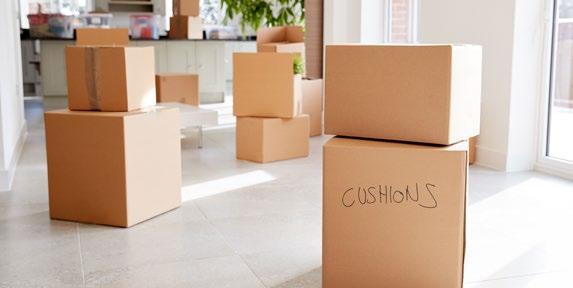
You should be aware of the following:
• We will charge you for any repairs or redecoration that you should have carried out, but have failed to do, and for damage or missing fittings
• We will charge you for the cost of removing any rubbish or items, which you leave behind
It is your responsibility to ensure that your rent account is clear, at the end of your tenancy.
In the event of the death of a resident, CCHA can support the next of kin, administrator or executor of the Will, to end the tenancy. It is essential that we receive a copy of the Death Certificate, to enable us to end any tenancy.
Our staff will deal with the matter promptly and sensitively. Staff will use their utmost discretion in ensuring that the tenancy is ended efficiently, whilst meeting your needs at what is, invariably, a distressing time. This could involve reducing the period of notice.
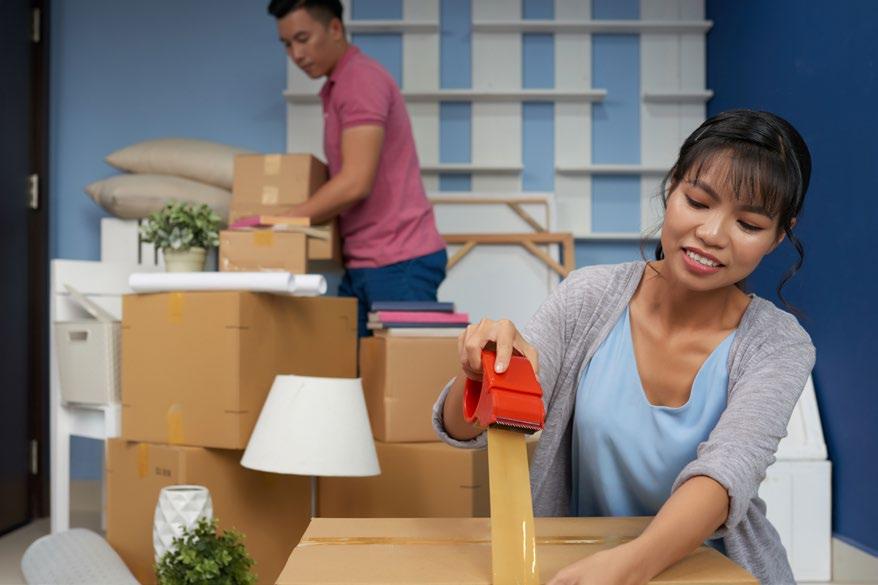
Once you’ve told us that you wish to move out of your CCHA home, you should also:
✓ Take gas, electricity and water meter readings on the last day of your tenancy, so you are not over charged, and provide your supplier with your forwarding address
✓ Notify your Local Council Tax office, and your Housing Benefit office if you are currently receiving Housing Benefit, and them with your forwarding address. If you receive Universal Credit, you will also need to inform the DWP and Pensions of your change of address
✓ Let your telephone and broadband provider know, so they can disconnect your phone line
✓ Give the Post Office a forwarding address, in order for mail to be redirected to your new home
✓ Ensure that your garden is left to an acceptable standard, ensuring that bushes and trees are cut back and the garden is free from any rubbish
✓ Remove all furniture and belongings from the property. If you do not do this before moving out, we will remove them and you will be charged a fee
✓ Complete all minor repairs, which you are responsible for
We know that more and more of you are using social media to connect with your friends, colleagues and organisations that you engage with everyday.
As a resident focussed organisation, we’re actively using social media to engage with our current and future residents.
We’d love you to join our growing community on Facebook, Twitter and LinkedIn.
You can expect to see regular posts, sharing:
• Inspiration and advice, including fun, engaging content that will entertain and inform
• Competitions, with regular chances to win High Street Shopping Vouchers! Look out for them throughout the year
• Details of the homes we have available for rent or sale
• Practical information and advice that we think may help you
Though you can message us via social media, we recommend you only use this channel for nonurgent enquiries.